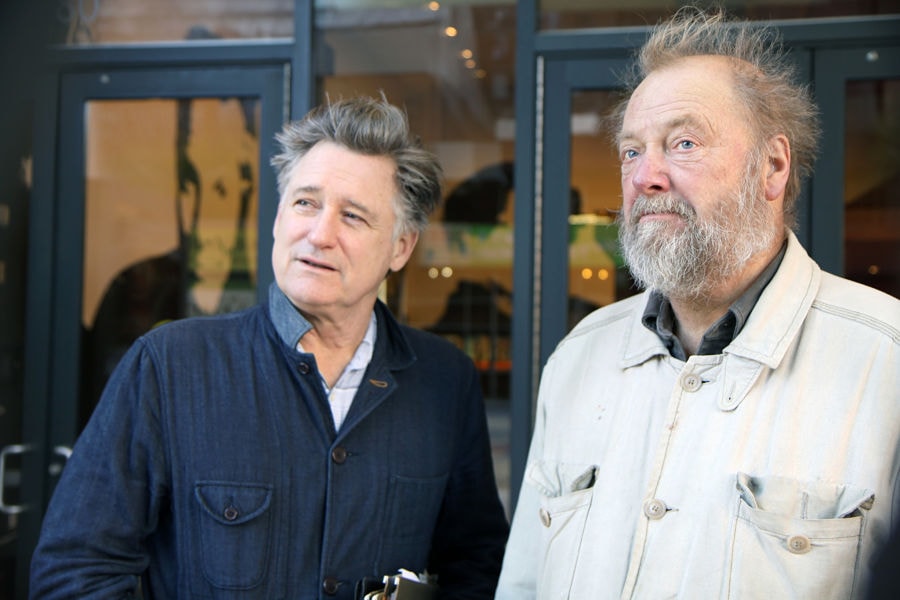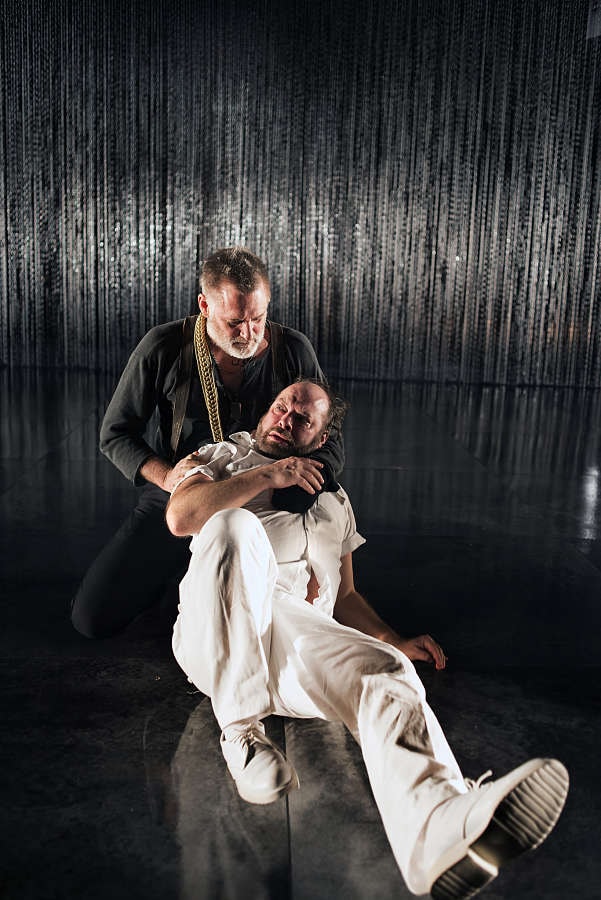We all think we know the drill when dealing with a trio of problematic Shakespeare plays that, while they show no signs of going away, routinely require some reframing or contextualization in our ostensibly more enlightened age. Some special attention must be paid when you’re staging The Taming of the Shrew, to adjust its retrograde gender views; The Merchant of Venice, to temper its slightly queasy, semi-sympathetic depiction of anti-Semitism; and Othello, to moderate its touchy treatment of race, in particular blackness.
But while Shrew and Merchant are irreducibly about gender and anti-Semitism, might Othello in fact be more about cultural difference than racial essence? The exact provenance of Shakespeare’s “Moor of Venice” has kept scholars debating for centuries, though it seems clear that the earliest interpretations cast him as a sub-Saharan African, not a North African Arab or Berber. And Shakespeare’s text does refer to his color (black) and his “thick lips.”
Ever since Edmund Kean’s 1814 Othello, there has been a robust counter-tradition of portraying him as an Arab. Whether black or Arab, though, Othello has most frequently been embodied by white actors in brown- or blackface—a lamentable practice that continued as late as the 1990s. Now, at least in the U.S., African-American actors (with a few notable exceptions) have laid claim to the role, for better or worse.
Upstate New York-born Bill Pullman, known on film and TV for playing everyguys and the occasional head of state but onstage for edgier fare (including The Jacksonian and The Goat), would seem to be the unlikeliest of Othellos. The idea stemmed from a stroll through Times Square a few years ago with Stein Winge, a Norwegian director he once worked with at the Los Angeles Theatre Center, and whose work he has traveled to Bergen to see. The pair noticed a billboard for the Netflix series “Lilyhammer,” in which a New Jersey gangster played by Steven Van Zandt is stranded in a small Norwegian town where the language barrier is steep. Winge wondered: What if Othello were the story of an American Navy man adrift in Norway? And what if his confusion and isolation grew not from racial alienation but from that disconnect? At the very least, they agreed, the concept was worth talking about—and it could give Pullman a chance to dig into a role few white, English-speaking actors would even dare to approach.
Fast-forward to Feb. 7, 2015: Winge’s production of Othello, starring Pullman and featuring frank, contemporary dialogue in both English and Norwegian, opens at Bergen’s National Stage, where it continues through March 14. The actor and director met with me late last year in the lobby of the Signature Theatre, where Pullman was performing in the New Group’s acclaimed revival of David Rabe’s Sticks and Bones, to talk about their impending project. This is an edited transcript of our conversation.
ROB WEINERT-KENDT: You two go way back, don’t you?
STEIN WINGE: We did Barabbas by De Ghelderode at LATC—it’s a fantastic play. But I remember one of the reviews in a small paper in L.A. said, “This director must never come back to the U.S.A. He must be stopped.”
How did this Othello come about?
BILL PULLMAN: My wife and I went to Norway a year ago for the first time so I could see The Wild Duck, directed by Stein.
WINGE: Then I came to visit Bill on his 60th birthday and it really started. We were supposed to work together; we were going to do Dance of Death. But then I saw that big poster of the second season of “Lilyhammer” and I thought, “Wow. He speaks English, he speaks a little Norwegian—they answer in English.” It’s a bad series, but all of Norway loves it. So the idea started to boil in my head. I told Bill, “You cannot play Othello in America, you cannot play Othello in England—this is not allowed, to have a white person playing Othello. But in Bergen we can do it, you know?”

So the idea is that he’s an outsider.
WINGE: Yeah, he’s an American from Montana, or Kentucky, or someplace—you have a farm in Montana, don’t you, Bill? So I thought, “It’s brilliant! He doesn’t know Norwegian, so they can talk a lot without him understanding, and he can get paranoia over, ‘What did you say now? What did you mean by that?’”
PULLMAN: Which happens in the play quite a bit—there’s a lot of crucial things in the play about Othello being old and always saying, “Iago, what is it that I see?” or, “What is it that was said?” or, “Who do I hear?”
This is a very interesting thing about Shakespeare in Norway and other countries—you aren’t doing William Shakespeare’s text, you’re doing an adaptation. I sat in rehearsal for King Lear last year, and learned that Norwegian is an amazingly good language for playing Shakespeare—it’s got such clarity and guttural strength, almost like Old English. English has gotten softer in the last 400 years.
WINGE: English actors envy us, because we can translate it every five years, or whenever we want to. That’s why we don’t use blank verse. Even Ibsen we translate. He wrote kind of in Danish, you know? We can never do it as it was written. We have to show these plays to people now, not ancient people.
Even Ibsen’s dialogue needs to be translated?
WINGE: We have to clean it. We “wash it”—that’s what we say.
Bill, Othello is not a part you probably ever dreamed you’d do, is it?
WINGE: Especially not in Norway.
PULLMAN: Well, I have been thinking about Othello more than I had before, because I had seen a couple of productions that weren’t working. The play is called The Tragedy of Othello, but people go to see Iago now. I think it’s our contemporary times—the bad guy is always interesting, the Machiavellian, noir kind of thing. Also, there’s some difficulty with the way the actor who plays Othello gets so involved with the sense of the “noble Moor.” So many things Othello does are quite stupid, quite gullible, but we have so much race baggage that it becomes hard for a black actor to portray someone who can be stupid, who can be impulsive and animalistic, because we don’t want to see that.
In the noir template, he’d be the cuckolded husband, which is always the least interesting character in that kind of story.
PULLMAN: Yeah. So the depth of the tragedy isn’t there. With this idea, we might go in some directions where maybe we can find new dimensions.
WINGE: I did one of the scenes in a theatre school with just white students. I found that what is scary is the mental thing that Iago is trying out, and following Othello as he slowly gets brought down. That’s why Othello’s situation is so extreme and terrible to look at—because we can see moment to moment how he’s taken down by Iago, and how he tries to get up again.
PULLMAN: But Stein, you put a lot stress on the idea that Iago is improvising.
He doesn’t have a master plan.
WINGE: No, no, no. Harold Bloom said the same thing. Iago knows he’s lying, including to himself. And he cannot know how Othello will react, so he’s improvising, and he continues doing it. I think he gets shocked by what he starts, and that he never thought it should go so far. That is terrible to look at. If it’s a master plan? Less so.
PULLMAN: Also, Othello and Iago are soldiers, so there’s the idea of trust. You might not understand the language being spoken to you, all the nuances and the depth of it, so you are trusting in a way that you wouldn’t be outside of the military connection. Othello is a man locked inside this glass bubble of language.

WINGE: And the really terrible thing is also that they’ve been fighting together for seven years, back to back, helping each other, saving each other on the field. Othello has never dealt with women—he’s been fighting the whole time. It is fantastic for him to meet Desdemona and get to know her. But the one he trusts is Iago. That makes the trap even worse. He can question what Iago is saying, but he will trust him all the way to the last scene. What Iago forgot was his own wife, Emilia. It’s a terrible end to the play. I think it’s the most evil play Shakespeare ever wrote. What else is there? Macbeth?
What about King Lear? That is pretty bleak.
WINGE: Yes, but that’s a whole other level; that’s not so realistic.
So let me ask you: Is it your working assumption that Othello is not a play about race per se, in a way that, say, Merchant is about anti-Semitism?
WINGE: I don’t think it is.
PULLMAN: You know Adam Gopnik, from The New Yorker? He came to hear a reading and he said you could interchange with “Moor” with “Frank.” A Frank is from Germany, a Celtic tribe.
WINGE: It’s more like outsider-ness; it’s not race.
PULLMAN: There is a line about his “fat lips.”
WINGE: We’ll fix that.
In the Peter Sellars production a few years ago, John Ortiz’s Othello was very upright, so his ignorance played more as an excess of pride, or inattention. It sounds like your take is a little rawer.
PULLMAN: I saw the Adrian Lester production in London, with Rory Kinnear in a celebrated performance as Iago. I remember thinking, this is Nick Hytner, this is an incredibly lauded production, but it didn’t take me down. My favorite part of the Sellars production was Jessica Chastain’s Desdemona—she was so wonderfully comfortable in her own skin that she touched everyone in the same beautiful way. So when she touched Cassio, you saw it coming. Even before she touched him, you knew: Oh no! Terrible! But beautiful. I’d never felt that so strongly.
WINGE: What you will discover with your Desdemona, Siren Jørgensen—she has such a lot of humor, so that’s also something that blinds you. That’s her natural way of being. The actress is totally sweet and brilliant. And that makes the tragedy even worse.
Derrick Lee Weeden, who played Othello at Oregon Shakespeare Festival about 15 years ago, told me he thought the part was “overclimaxed”—meaning that Othello starts suspecting so early in the play, then spends the rest of it not acting on his suspicions—a bit like Hamlet.
PULLMAN: I feel the same thing. This play is hard for that reason: Othello gets suspicious so early, and so much of the play happens in that suspended animation—it feels like it’s long.
WINGE: In the opera, it’s even longer.
What productions have you seen, Stein?
WINGE: The best Othello I saw was in Germany, directed by Peter Zadek.
PULLMAN: In blackface?
WINGE: Yes, blackface, and he was sweating it away by the end.
Has this play been done in Norway with a black actor?
PULLMAN: The last time this production was done in Bergen was 52 years ago, by a black American actor, Earle Hyman—who, freakishly, knew Norwegian.
WINGE: Because he studied Ibsen.
PULLMAN: But it’s interesting: If you do Merchant of Venice, does Shylock always have to be played by a Jewish actor?
No, but he’s always played as a Jew; you can’t really avoid that.
PULLMAN: It’s hard to know where you draw the line. Maybe we should just do it with true Venetians; wouldn’t that be a great production?
Bill, how do you explain this project to your film and TV agents?
PULLMAN: I have had such a hard time—I don’t tell Stein all the people who don’t want me to go to Norway. But this is so important to my life. I’ll tell you, all the film and television things—you do them, and everyone gets so excited about them, and then they disappear so fast. Whereas I’m always amazed about the shelf life of a theatre piece. The Goat was on Broadway, the longest run I had ever done, I think it was seven months, and 600,000 people saw that. That’s a bad night for a movie or a TV show, where if you get 10 million, that’s a disappointment. But people always come up to talk to me aboutThe Goat, and that TV show I did shortly before? Twelve years later, no one has mentioned it. The theatre has more staying power than you think. Maybe it’s a smaller pool of people, but the integrity of the experience stays with them.

When people other than your agents ask you about this, how do you explain it to them?
PULLMAN: They think I’m making a joke. I’ll say I’m going to Bergen in the middle of winter to play Othello. Of course, everyone doesn’t know that Bergen is not as cold as up north—they think I’m going to the North Pole.
Stein, where does Shakespeare fit with Norwegians?
PULLMAN: Is it No. 1, Ibsen, No. 2, Shakespeare?
WINGE: Sure. Or Chekhov. I’ve done so much Shakespeare. I’ve done Richard III many times, and Henry VI many times. What the conflicts are about is contemporary all the time. I would love to do Antony and Cleopatra. This is a political play. And Julius Caesar, that’s a great play.
Bill, have you done a lot of Shakespeare?
PULLMAN: Not in a long time. I started in Montana at a Shakespeare festival that toured around—I did seven years with them. Some of those actors I’m still in touch with. We did a lot of the comedies.
WINGE: You know what I hate? Shakespeare’s comedies.
PULLMAN: You’ve never directed any Shakespeare comedy?
WINGE: I think after 450 years, humor has changed. It’s not fun. I did As You Like It, and it was okay. But all this mixing with the couples? Give me a break. I don’t see the light at the end of the tunnel!


